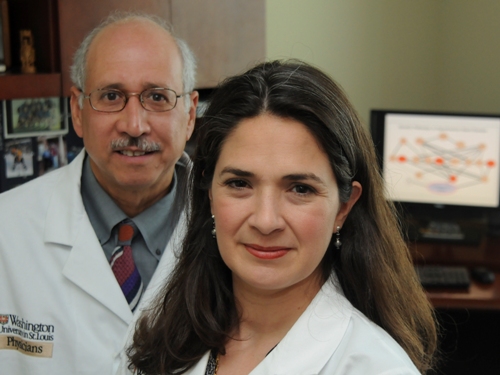It may not be easy or pleasant, but weight loss has more benefits than looking good in a swimsuit. Losing even a little weight can greatly improve heart and vascular health, boosting heart function, lowering blood pressure and improving metabolic measures. A research program at Washington University School of Medicine is dedicated to understanding the complex relationship between weight and heart health; its work shows that weight-loss benefits can last even if some of the weight returns, and that the effort can not only prevent but reverse significant health problems.
In recent studies of obese people, Washington University researchers followed patients in a weight-loss program and demonstrated that four key measures of heart and vascular health improved in those who lost weight. Using advanced heart-imaging tests, they found that the heart’s pumping ability, its ability to relax, the thickness of the heart muscle tissue and the thickness of the carotid artery walls all improved. The benefits continued over many months, even after an individual stopped losing weight and regained a few pounds.
Their findings are important to heart health because thickening of the heart muscle and impaired pumping and relaxation functions are predictors of heart failure. Increased arterial wall thickness is a predictor of plaque formation that can contribute to blockages in arteries and eventually lead to heart attack or stroke.
 “An obese person requires a heart that is able to pump greater amounts of blood, so the chamber size—the actual cavity of the heart—enlarges, and the muscle gets thicker as well,” says Lisa de las Fuentes, MD, a Washington University cardiologist at Barnes-Jewish Hospital. “Over time in some individuals, the heart cannot compensate, and after a while, it begins to lose some of its ability to relax or its ability to pump blood to the rest of the body. Both can lead to heart failure.”
“An obese person requires a heart that is able to pump greater amounts of blood, so the chamber size—the actual cavity of the heart—enlarges, and the muscle gets thicker as well,” says Lisa de las Fuentes, MD, a Washington University cardiologist at Barnes-Jewish Hospital. “Over time in some individuals, the heart cannot compensate, and after a while, it begins to lose some of its ability to relax or its ability to pump blood to the rest of the body. Both can lead to heart failure.”
De las Fuentes says it was important to evaluate whether moderate weight loss could improve heart health. When the study began, none of the patients enrolled had clinically evident signs of heart failure, such as shortness of breath, coughing or fluid buildup, and none were taking cholesterol-lowering medications. About one-third were being treated for high blood pressure.
“Hypertension, or high blood pressure, is a huge public-health problem in the United States,” says Barnes-Jewish Hospital cardiologist Victor Dávila-Román, MD, director of the Cardiovascular Imaging and Clinical Research Core Laboratory at Washington University. “Of the 65 million people with hypertension, between 25 percent and 50 percent have some evidence that their heart has been affected, so the presence of high blood pressure in so many of these subjects suggested that we needed to take steps to help them lower their blood pressure if we hoped to make their hearts healthier.”
Study subjects were instructed to eat either low-fat or low-carbohydrate diets— about 1,200 to 1,500 calories per day for women and 1,500 to 1,800 for men.
Both groups experienced similar amounts of weight loss and similar improvements in heart and vascular measurements. Subjects lost an average of 22 pounds, which represented about 10 percent of their body weight, according to de las Fuentes. Interestingly, she says the cardiovascular benefit didn’t appear right away, lagging behind weight loss. In fact, the greatest improvements in heart function didn’t come until six to 12 months after the study began, in spite of the fact that beginning at about six months, many of the participants began slowly to regain some of the weight they had lost.
Although the average weight loss was more than 20 pounds, by the time two years had passed, most participants weighed only about nine pounds less than they had at the start of the study. Even though they regained some weight, they still retained much of the heart and blood vessel benefit related to their weight loss.
“Not only did we catch them at the point of their maximum weight loss, we also continued to monitor people as they regained weight they had lost,” de las Fuentes explains. “We wanted to assess not only the impact of the initial loss of weight on the cardiovascular system but also the impact of regaining weight.”
 The heart benefits persisted, and de las Fuentes says that although it’s possible that those beneficial effects would eventually end if people returned to their previous weight, it is clear from the study that the benefits of losing weight last for a long time. But total body weight isn’t the only factor. Other research suggests that when body fat collects in the liver, it usually spells trouble. People whose fat accumulates in the liver experience serious metabolic problems such as insulin resistance, which affects the body’s ability to metabolize sugar. They also have increases in the production of fat particles in the liver that are secreted into the bloodstream and increase the level of blood lipids, such as triglycerides.
The heart benefits persisted, and de las Fuentes says that although it’s possible that those beneficial effects would eventually end if people returned to their previous weight, it is clear from the study that the benefits of losing weight last for a long time. But total body weight isn’t the only factor. Other research suggests that when body fat collects in the liver, it usually spells trouble. People whose fat accumulates in the liver experience serious metabolic problems such as insulin resistance, which affects the body’s ability to metabolize sugar. They also have increases in the production of fat particles in the liver that are secreted into the bloodstream and increase the level of blood lipids, such as triglycerides.
But as de las Fuentes and Dávila-Román learned with heart health, many of the metabolic problems associated with fat in the liver also can be slowed, or even reversed, with weight loss.
“It’s completely reversible,” says Samuel Klein, MD, director of Washington University’s Division of Geriatrics and Nutritional Science, Center for Applied Research Studies, as well as its Center for Human Nutrition. “Calorie restriction and minimal weight loss can markedly reduce fat content in the liver. In fact, as little as two days of calorie restriction can cause a large reduction in liver fat and improvement in liver insulin sensitivity.”
For years, scientists noticed that where individuals carried body fat influenced their metabolic and cardiovascular health. Increased fat in the belly, known as visceral fat, was associated with an increased risk of diabetes and heart disease. Overweight people who carried weight in their hips and thighs, rather than the belly, seemed to have less risk for those problems.
“Visceral fat has long been associated with metabolic risk, which has led to the belief that visceral fat might even cause metabolic dysfunction,” Klein says. “However, we’ve learned that visceral fat tracks closely with liver fat, and it appears that fat in the liver is a better marker of metabolic dysfunction and cardiovascular risk.”
Klein says people who are obese but don’t have high levels of fat in the liver should be encouraged to lose weight, but those with elevated liver fat are at particularly high risk for heart disease and diabetes and need to be treated aggressively to help them lose weight, because dropping a few pounds can make a big difference.
And looking at the big picture, the researchers say losing 10 percent of your body weight may be enough to do the trick. You don’t need to drop 50 pounds or develop “abs of steel” to get healthier, and they say losing 15 or 20 pounds may be difficult, but it’s not impossible. And even those who can’t lose that much weight can still benefit from smaller amounts of sustained weight loss.
“Losing 20 or so pounds might seem daunting, but we’ve shown that even a modest weight loss can yield heart and vascular benefits,” de las Fuentes says. “It’s important to realize that you can choose goals that are attainable and work towards those goals progressively. A person doesn’t necessarily need to get back to his or her ideal body weight to improve heart function, because even small amounts of weight loss seem to improve metabolic function and hypertension, as well as enhance heart pumping and relaxation, while causing the heart tissue and blood vessel walls to get thinner. Cholesterol and triglyceride levels usually improve, too.”
Other studies of weight loss and its effects on metabolism and cardiovascular function currently are under way. For more information, call Volunteer for Health at (314) 362-1000.